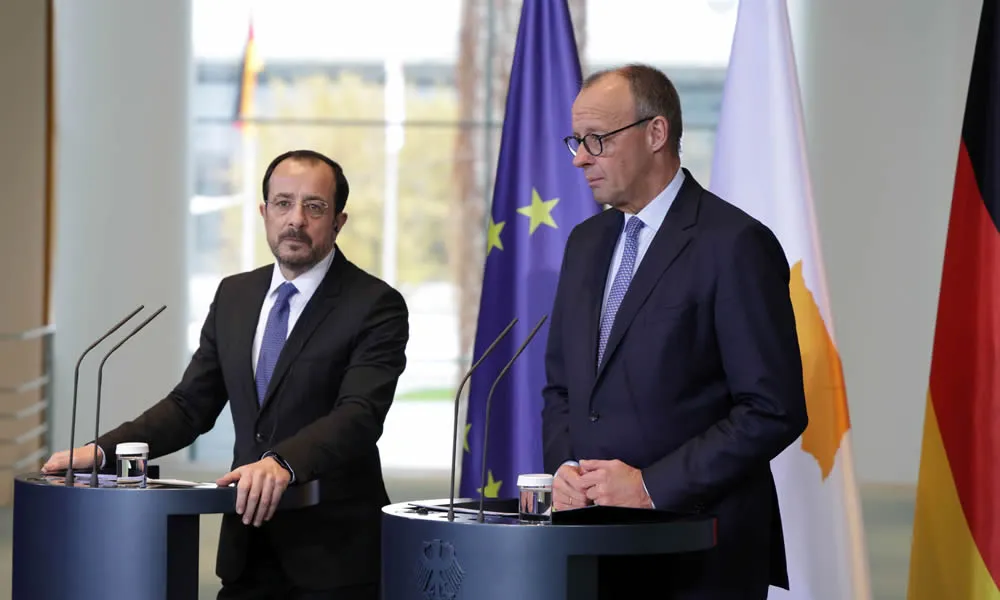By Stefanos Evripidou in Berlin
German Chancellor Friedrich Merz said on Friday he is prepared to take on a more active role during Cyprus’ EU Presidency to overcome the island’s division “step by step”, utilising Germany’s good relations with Turkey.
Speaking after bilateral talks with President Nikos Christodoulides in Berlin, Merz said he was honoured to be asked to take on this role.
Step by step approach
“The president appealed to me to support him so we can step by step overcome the problems and division of the island, and through our good relations with Turkey, to make some first steps in that direction,” said Merz.
The chancellor expressed Germany’s readiness to participate actively in the president’s specific proposal.
“Personally, I consider it a great honour,” he added.
Merz said he would work with his associates in the coming weeks and during Cyprus’ EU Presidency to achieve progress on specific proposals discussed with the Cypriot president in the hope this may overcome the island’s division, “at least in certain areas”.
Christodoulides thanked Merz for responding to his call to take on a bigger role to achieve parallel progress on the Cyprus conflict and EU-Turkey relations. He added that Cyprus was ready to take a positive approach to reaching a mutually beneficial outcome.
"The EU has the tools and incentives to lead us to a mutually beneficial state of affairs for the entire Cypriot people, for Turkey, for Euro-Turkish relations, but also for the wider region and here, in this great effort, Germany has an important role to play in helping us reach a mutually beneficial state of affairs," said Christodoulides.
The two leaders also discussed Merz’ recent visit to Ankara. The German chancellor higlighted the need for closer EU cooperation with Turkey.
Proposals on Cyprus and EU-Turkey relations
According to sources, the proposals discussed revolved around identifing areas of mutual interest and promoting EU-Turkey relations in parallel with taking steps forward on Cyprus.
For example, agreeing on visa liberalisation for a certain category of Turkish nationals (e.g. business people) in exchange for opening one Turkish port to Cyprus-flagged ships.
Another idea was to invite Turkish Foreign Minister Hakan Fidan, (and/or President Tayyip Erdogan) to the informal six-monthly meeting of EU foreign ministers (known as Gymnich), held under each EU Presidency.
Efforts would also focus on seeking the resumption of Cyprus peace talks within the internationally agreed framework.
Cyprus’ EU Presidency
Elsewhere, Merz praised Cyprus on its intensive preparations for the EU Presidency, noting that the country will have a significant role to play in modernising the Multi-Annual Financial Framework with the goal of preparing the ground for agreement among EU member states on the EU’s long-term budget so as to face major challenges.
The two leaders also discussed strengthening EU competitiveness, based on an agreement last month by 22 EU leaders, highlighting the need to give the EU economy a boost by reducing bureaocracy and simplifying EU rules.
Ukraine and Turkey
On Ukraine, Christodoulides and Mertz looked into ways to support Ukraine, which “was critical to EU security,” the German chancellor added.
The Cypriot president highlighted that Cyprus was not against utilising Russia’s frozen assets to support Ukraine financially, but, along with other countries, wanted to find the right legal path for this process to proceed.
He also brought up the issue of sanctions against Russia, noting that it’s not enough for EU member states to ensure full implementation of sanctions, but also states wanting institutional relations with the EU, in a clear reference to Turkey.
Asked to comment during the joint press conference, Merz said Germany condemns the circumvention of sanctions and constantly discusses this with the Turkish government. He noted that an additional package of sanctions would be prepared to keep pressure on Russia.
“We know that these sanctions have a direct impact on the Russian economy, on the regime in Moscow and do not forget the example of the two major oil exporting companies that are now being discussed in Europe. All of these are results of the sanctions that we are imposing,” said Merz.
He added that the Turkish government was aware of what was expected from it.
“For us, Turkey is an important partner in NATO, it plays an important role in the confrontation in Gaza. But if Turkey wants its contact (with the EU) and the intensification of this relationship, it must adhere to the Copenhagen criteria, which are clear regarding the rule of law and democracy.”
Asked about Erdogan’s recent reiteration about two states on the island of Cyprus, Christodoulides said: “If Mr Erdogan insists on positions on a two-state solution in Cyprus, Turkey will certainly not come close to the EU. Therefore, it depends on Turkey whether it will come close to the EU.”
He noted that both the EU and the international community support a Cyprus solution based on the resolutions of the UN Security Council, and EU principles and values.
On the issue of Turkey’s participation in the EU’s SAFE programme, offering low-interest defence loans, Christodoulides reminded that: “In order for a third country to be able to participate in SAFE, it must have a defence agreement, a security agreement with the EU. And at the moment we are talking, Turkey does not have such an agreement with the EU.”
Energy for Europe
When asked whether Cyprus could be part of the solution to the European Union's energy needs, the Cypriot president noted that the Eastern Mediterranean could also be developed as an alternative energy corridor for Europe.
“Cyprus, in close cooperation with neighbouring states, mainly Egypt and Israel, is cooperating in this area and our goal, we have also proceeded to sign relevant agreements, is to be able to export the first Cypriot natural gas to Europe in 2027,” he said.
